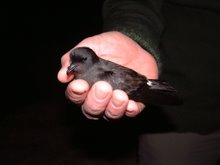
Our secret weapon for catching stormies is a small bottle of Dimethyl Sulphide -which is the chemical released when phytoplankton are grazed by zooplankton. Amazingly, the smell of this can be detected by petrels over large distances at sea, and used to home in on patches of high productivity in which larger zooplankton and fish (storm petrel prey) are likely to be found. Whether this actually lures petrels in to our nets is a topic of much debate at Cruzinha -Renata is healthily sceptical while Rob is a True Believer. Only time and an end-of-season stats test will tell us the answer...
SECRET WEAPON UPDATE
The end of season stats were rather ambiguous (there either is, or is not, a Secret Weapon Effect, depending on which stats test one chooses), so we are keen to continue this experiment over the summer, at other points along the migration route. If you are a petreller and would like to take part in this experiment by using the Secret Weapon on 50% of your catching nights, please contact Rob Thomas (ThomasRJ@Cardiff.ac.uk) to be sent a bottle of dimethyl sulphate (with accompanying risk assessment).
FURTHER UPDATE
Thanks to those who have volunteered so far to join in with this experiment:
Bob Harris (Eilan Nan Ron, Scotland)
-Adrian George (Anglesey, Wales / Tyne & Wear, England)
-John Brown (Tyne & Wear, England)
-Declan Clarke (Sheepland, Northern Ireland)
-Kieran Foster (North Wales)
Here are some additional notes on the method:
1. In Portugal, we simply alternated nights with and nights without the dimethyl sulphate scent-lure, to test whether we caught more stormies on nights with the scent-lure in operation.
2. On the long Portuguese summer nights (7 hours of catching), we set up the scent lure at dusk, but further North with much shorter nights it may be worth setting up the scent lure some time before dusk, so that a downwind odour trail is already well established by the time catching begins.
3. In Portugal, we simply took the lid off the container to let the smell drift downwind, but it may be worth experimenting with some sort of absorbent wick, to increase the rate of evaporation.
4. We had the impression that our pot of dimethyl sulphate became less smelly over time, so for the last few nights of our field season we used a fresh bottle. Let us know if you need fresh supplies sent to you!
By way of encouragement, here is a reference suggesting that the secret weapon effect really does work on land, at least in the middle of a Leach's petrel colony!
Nevitt, G.A. & Habermann, K. 2003. Behavioral attraction of Leach’s storm-petrels (Oceanodroma leucorhoa) to dimethyl sulfide. Journal of Experimental Biology 206: 1497-1501.


No comments:
Post a Comment